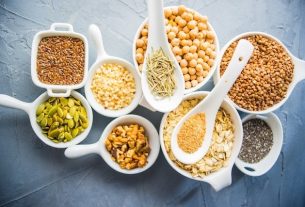Vitamin B1, also known as thiamine, is an essential nutrient for the body, as the body is not capable of synthesizing this vitamin, which is necessary for several metabolic processes, such as helping to transform the food consumed into energy.
Furthermore, thiamine is important for the growth and functioning of the body’s cells and the conduction of nerve impulses, and can be found in various foods, such as brewer’s yeast, wheat germ, whole grains, nuts and meats. However, vitamin B1 can also be found in supplements, which may be recommended by a doctor or nutritionist in case of deficiency of this vitamin.
Vitamin B1 deficiency is not common, although it can occur when the intake of this vitamin is insufficient, especially when eating a diet rich in refined carbohydrates, such as white flour and sweet foods, or when the demand for thiamine is increased, such as in case of pregnancy, nursing or physical exercise.

What is thiamine used for?
Vitamin B1 can bring several health benefits and serve various processes in the body, the main ones being:
1. Generate energy for the body
Vitamin B1 participates in several important metabolic reactions for the body, mainly in the process of transforming consumed food into energy.
Furthermore, vitamin B1 is necessary for cells, which are part of all tissues, to carry out their different functions. It is also important for the metabolism of fats in the body and participates in the synthesis of several compounds that form the structure of DNA.
2. Protect the nervous system
Vitamin B1 is important for maintaining the neuronal membranes that surround and protect nerve fibers, ensuring rapid conduction of nerve impulses. In addition, it participates in several processes necessary to maintain nervous tissue and allow it to perform its functions correctly.
Thus, this vitamin is fundamental for the functioning of the nervous system and everything related to cognitive capacity, stimulating memory, concentration and learning, in addition to preventing neurological disorders and diseases such as Alzheimer’s.
3. Maintain cardiovascular health
Thiamine is responsible for the production of acetylcholine, a neurotransmitter found in the central nervous system and which acts in the transmission of impulses between neurons and muscles, especially the heart. Therefore, this vitamin is important for the heart to function correctly, preventing cardiovascular problems, such as heart failure.
4. Protect eye health
Vitamin B1, together with other micronutrients, such as vitamin A, is capable of protecting the eyes, preventing vision loss and diseases such as glaucoma and cataracts.
5. Prevent diabetes
Thiamine deficiency appears to impair pancreas function and cause hyperglycemia, increasing a person’s risk of developing diabetes. Therefore, consuming foods rich in vitamin B1 could help balance glucose concentrations in people with prediabetes.
6. Improve immune system function
Vitamin B1 has antioxidant action, preventing oxidative damage to cells of the immune system, in addition to having anti-inflammatory action, helping to prevent flu, colds and other infections.
7. Improve mood
Thiamine helps regulate emotional stress, improve mood and mood. Furthermore, it can contribute to the treatment of depression, reducing symptoms in people with this disorder.
8. Combat thiamine-sensitive megaloblastic anemia
Thiamine is important for combating thiamine-sensitive megaloblastic anemia. This type of anemia is not very common, being caused by changes in genes that reduce the absorption of this vitamin, resulting in a decrease in the number of red blood cells and an increase in their size.
Foods rich in vitamin B1
The following table shows the amount of vitamin B1 in 100 grams of food:
In addition to these, other foods also contain vitamin B1, but in smaller quantities, such as garlic, offal, oysters, cauliflower, asparagus, artichokes, sole, eggs, mushrooms, potatoes and oranges.
Daily amount of vitamin B1
The recommended amount of thiamine varies depending on age and gender:
- Babies aged 0 to 6 months: 0.2 mg/dia;
- Babies aged 7 to 12 months: 0.3 mg/dia;
- Children between 1 and 3 years old: 0.5 mg/dia;
- Children between 4 and 8 years old: 0.6 mg/dia;
- Children between 9 and 13 years old: 0.9 mg/dia;
- Boys between 14 and 18 years old: 1.2 mg/dia;
- Girls between 14 and 18 years old: 1.0 mg/dia;
- Men: 1.2 mg/dia;
- Women: 1.1 mg/dia;
- Pregnant women: 1.4 mg/dia;
- Breastfeeding period: 1.4 mg/dia.
These values indicate the minimum amount of vitamin B1 that must be ingested per day to maintain the proper functioning of the body.

Sign up for our newsletter and stay up to date with exclusive news
that can transform your routine!
Warning: Undefined array key "title" in /home/storelat/public_html/wp-content/plugins/link-whisper-premium/templates/frontend/related-posts.php on line 12
Warning: Undefined array key "title_tag" in /home/storelat/public_html/wp-content/plugins/link-whisper-premium/templates/frontend/related-posts.php on line 13




